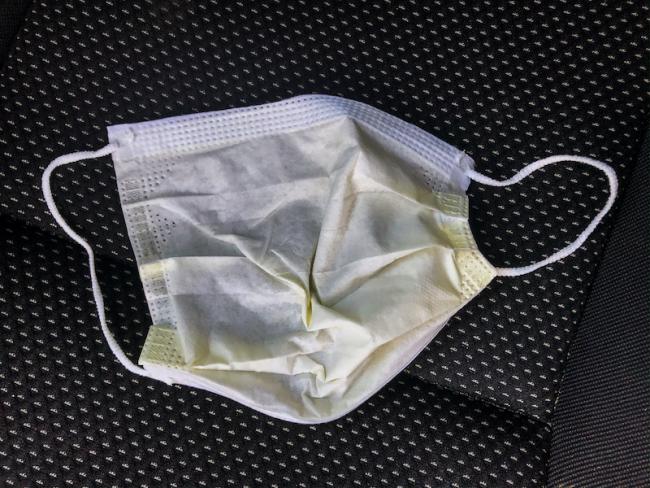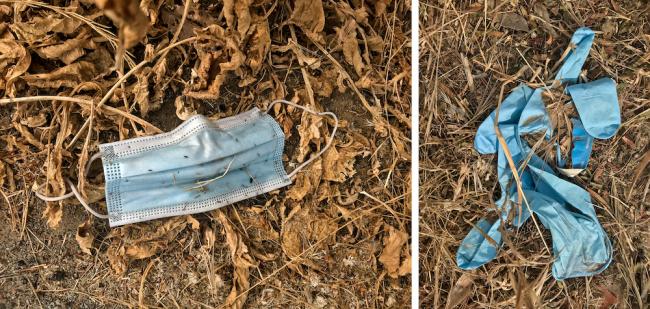
This piece appeared in the Fall 2020 issue of NACLA's quarterly print magazine, the NACLA Report. Subscribe in print today!
When the AIDS epidemic came to light in 1981, the public health response was slow. Queer and vulnerable communities not only had to self-advocate, but also develop protocols of care to protect themselves and their loved ones. Although the coronavirus is very different from HIV, the legacy of AIDS activism nevertheless may offer lessons for the current health emergency on how to combat stigma, prevent spread on a community level, and respond to crisis with solidarity.
In this conversation, artist, educator, and organizer Pato Hebert speaks with medical anthropologist Edgar Rivera Colón about life during the pandemic, its impacts on vulnerable communities, and the importance of cultivating an ethos of care while learning to live with the coronavirus. Hebert, whose work explores interconnectedness, has worked in grassroots HIV prevention initiatives with queer communities of color since 1994. Rivera Colón, an expert on Latinx queer cis male sexual cultures, trains health professionals as well as Black and Latinx activists on preventing HIV in their communities. Their insights from experiences in community activism, education, and spirituality permeate this discussion on inequality and resistance during the coronavirus crisis.
Hebert and Rivera Colón spoke via Zoom video call in late May from Los Angeles and Jersey City, respectively. Their conversation has been edited for length and clarity.
Pato Hebert: When we first made plans for this conversation, you gave me some love. I’m recovering from Covid-19, and you wrote in your email, “I hope you’re feeling well as you continue your slow recovery. We need to slow everything down these days to avoid getting caught up in the mania of this crisis that threatens to undermine the little progress we’ve made in the country and beyond.”
Your note began with that generous act of care and insight, but I missed it because I was racing into the body of the email looking for logistical details. I only observed it this morning, when I slowed down enough to reread your note as I was preparing for this call. How are you practicing slowness right now amid so much urgency and despair?

Edgar Rivera Colón: This is a note that I always send to other people, but it’s really a note to myself. When Trump won in 2016, activists were sad and then panicked. I wrote a piece called “We’re in Crisis! Time to Slow Down.” It’s from a particular experience in my activism. I went to one of my mentors after a decade working in the South Bronx. I said to him, “I’m burnt out.” And he said, “That’s great. At least that means you were on fire once. Right? There’re some people who were never on fire their whole lives. Accept that as a grace that you’re on fire. Now, stop that shit.”
That has been in my head around what do we do in light of the fact that elites make money from us speeding up. Part of a political and spiritual response to crisis is to practice slowing down enough to reflect upon where the interventions need to be made. This is the LGBTQ piece and the AIDS piece: Where’s my pleasure and desire? Esto es un proceso colectivo. Everyone adds their piece.
The slowing down was about capital—the way it valorizes itself. Racial capitalism is designed to speed us up. Paradoxically, the condition of possibility of all these elites speeding up is us staying structurally in place. They outsource their own social reproduction to folks like us. I’m part of a collective, even if I’m isolating. I’m a part of folks. This is the paradox for people like us. I think we forget that our folks, my factory mom and dad, have never begrudged us our self-development. They’ve always been generous. They’ve always said, “Mijo, véte a estudiar. Eso es bueno.”
PH: This was a collective investment in growth and development.
ERC: Exactly. When I was growing up in Jersey City, my brother was in the streets. Now, he never protected me. He was just like, “Don’t mess with him.” And I think the consciousness was, “That’s the kid that’s going to go to college, so let’s just preserve that resource for now.” I think a lot of us sometimes forget that we come from folks who have a long-term vision. And if you’re going to plant something, it takes time. The harvest takes time. How do we tend the garden of time? Because what do we own in this life? All you have to do is get sick and then you realize, “Hold up. There’s a whole process that needs to go on for me to get well again with a bunch of other people involved.” The reason I said take your time, be slow, is because I know you have many commitments. That is about time as one of the tools of healing.
PH: I’m sitting now with your mentor’s wisdom and that if you’re burned out it means you were once on fire. I’m thinking of Indigenous practices of cultural burns. What it means to sustain an ecology of relations through slow burns that are cyclical and repeated, and tending to a land that tends to you. And how this notion of being on fire, or with fire, is different than the intensity of capitalism’s push to produce, to burn out. It is a gift to be mindfully on fire with others. How amazing it is to be so hot together—whether that’s desire, movement, discovery, healing, old and ongoing practices of tending to place, and to one another in place.
Can you talk about your work in narrative medicine, and how the concept might guide us during what I’ve been calling la COVIDa loca?
ERC: I like that phrase, la COVIDa loca.

PH: That came from my friend Quang, a gay Vietnamese immigrant who loves pop culture. Back in the day we used to run around queer sub-referencing between the Selena movie and Ricky Martin in that era of “La vida loca.” Our jokes were a beautiful cross-cultural moment. So I can’t even lay claim to the term, though I’ve certainly been wielding it! But back to narrative medicine…
ERC: Narrative medicine is a response to burnout. The founder Rita Charon is a physician who has a PhD. The idea is to get people who are involved in healthcare to attend to an object—a literary object, an art object—and you have six or seven sessions where you talk about that object. You let people free write. Narrative medicine is a way to slow down and get to know each other, but also to begin to listen to each other—not as workers, but as people who are involved in healing and that’s always art, craft, and science.
I bring the ethnographer’s tools via qualitative research: an intersubjective practice of deep listening and hanging out. Narrative medicine is a field still in formation. I tell my students, “You decide what it’s going to be.”
What capitalism does in the healthcare system, on a structural level, is insist upon “just-in-time healthcare”—just enough beds, just enough staff. That’s the capital accumulation strategy of globalization. Just-in-time healthcare in this country is a disaster. What we see in healthcare is a quickening of the pace of surplus value extraction from these workers. Narrative medicine is responding to the crisis of corporate healthcare.
PH: The deep listening that’s integral to narrative medicine—small groups, slowing down, attention to an object—is a way to analyze and connect. Can you talk about how deep listening informs your practice as facilitator?
ERC: I think the listening piece is key. There’s a dialectical tension because listening can also be a position of power: “Tell me what you know.”
PH: Listening can just be extraction.
ERC: I’m with William Stringfellow, who said that listening is the most ancient form of human love. Deep listening is not about formulating arguments to respond to propositions. It’s about being vulnerable enough to accept that there’s a word that is being articulated to you. That word is a world. You have to be penetrated by it. You have to be open to being a bottom and top at the same time. I think that is how you let go of the authority of the teacher. We have to create this collective space of listening to each other. Deep listening is where we can express our desires. Where our desires are portals to each other. Those things that are most me are external to me. In that externality, I discover myself again.
Read the rest of this article, available open access for a limited time.
Pato Hebert teaches as an Associate Arts Professor in the Department of Art & Public Policy at Tisch School of the Arts, New York University. As an artist, he has exhibited in galleries, museums, and community spaces around the world.
Edgar Rivera Colón is a medical anthropologist and teaches at Columbia University’s Narrative Medicine program. He is coauthor of The Principles and Practices of Narrative Medicine (Oxford, 2017) and host of the podcast “Karl Marx Ate My Field Notes” on radical politics and spirituality.

